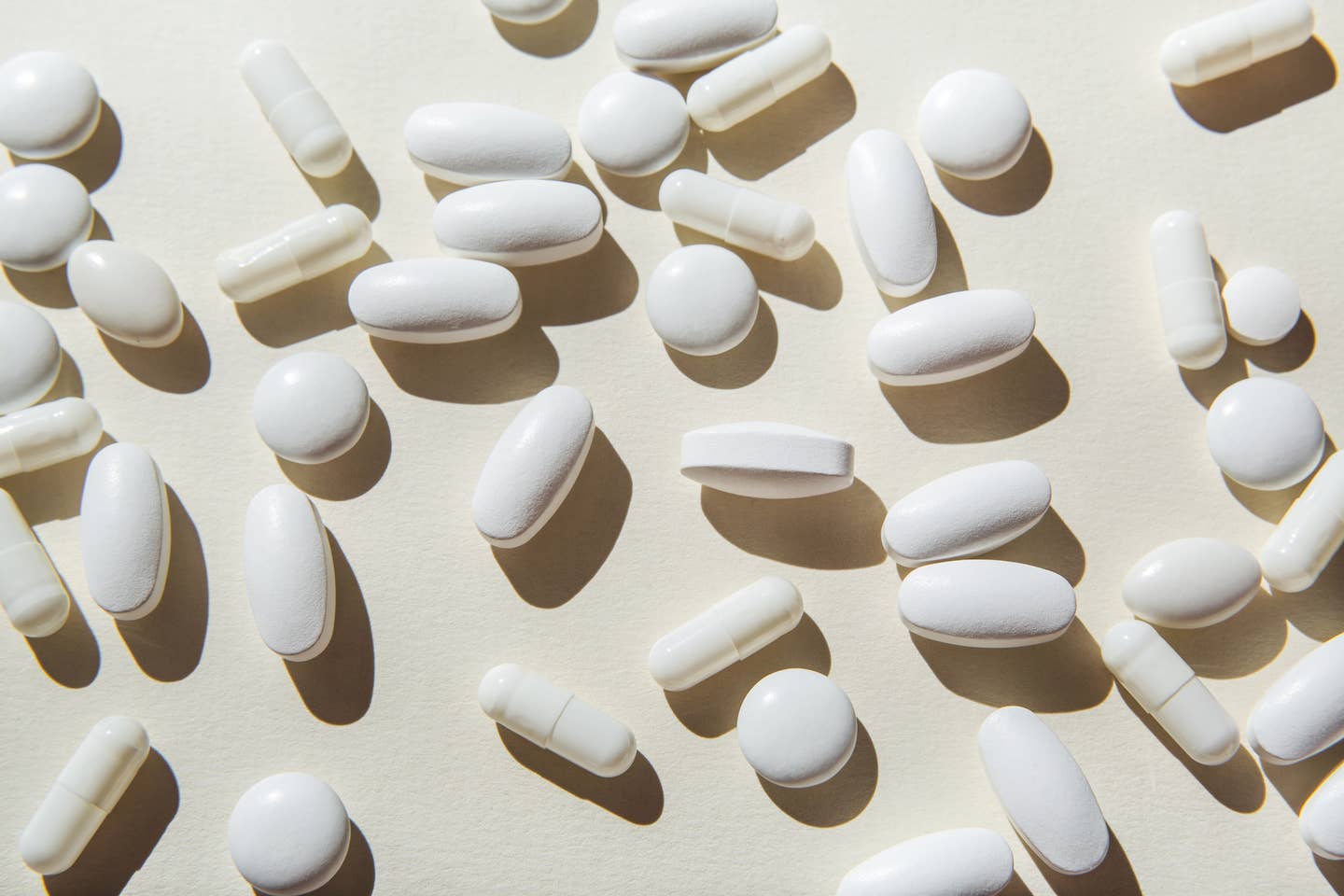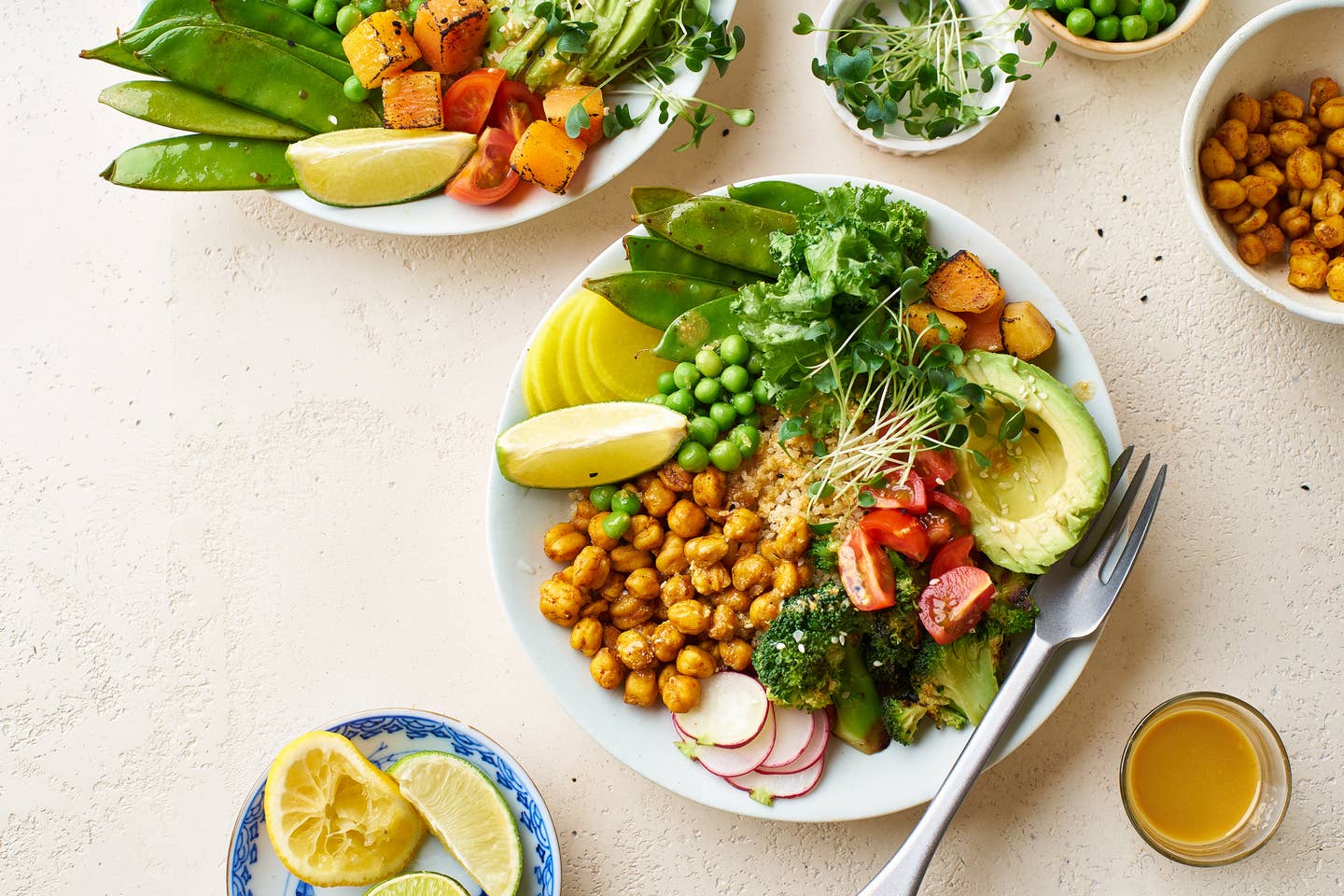
What’s the Difference Between Probiotics & Digestive Enzymes? An Expert’s Take
You've heard about probiotics for gut health, but you may have also read about the importance of digestive enzymes. What's the difference? They do two different things but both are beneficial for gut health, which in turn is vital for immune health, mood function and overall disease prevention. Here's what you need to know and whether you might want to consider taking probiotics or digestive enzymes for gut health.
Every time we eat, our body requires the use of specific digestive enzymes to break down our food. Digestive enzymes are proteins that help turn nutrients into substances your digestive tract can absorb. Your saliva has digestive enzymes in it, but most of all they are released by the pancreas, and do their main work in your intestines, which is where most of the breakdown and metabolism of food takes place.
The Importance of Gut Health
The gut is home to millions of beneficial bacteria, known as our gut microbiome. The microbiome controls a variety of health functions in the body, including influencing how well the immune system works, as well as impacting our brain's mood center, since your gut houses 90 percent of the body's serotonin, a chemical vital for mood regulation.
Both the digestive enzymes and the colony of beneficial bacteria in our gut are extremely important for overall health and wellbeing. The foods we eat directly impact our digestive enzymes and microbiome, and poor choices can tip the ratio of good bacteria to bad bacteria out of balance, and contribute to inflammation and eventually increase our risk of disease.
If our gut bacteria gets out of balance – driven by eating less healthy plant foods, and more processed foods, added sugars, and inflammatory foods like red meat – it can lead to chronic diseases including irritable bowel syndrome, type 2 diabetes, obesity and cardiovascular disease, research finds . The foods we eat directly impact our digestive enzymes and microbiome, and poor choices can contribute to inflammation and increase our risk of disease.
But what if you are already eating a mostly healthy, plant-based diet? This is where digestive enzyme supplements and probiotics can help your gut microbiome and digestion be as healthy as possible. Here is the difference between digestive enzymes and probiotics and how to add them to a healthy plant-based lifestyle for optimal health and wellbeing.
Are digestive enzymes the same as probiotics?
Digestive enzymes and probiotics are completely different, but work to achieve the same goal of improving our gut health. Digestive enzymes are naturally occurring in our body and help to break down certain foods for digestion. While our stomach and small intestine make some of these enzymes, our pancreas is the main organ that creates the enzymes that break down carbohydrates, proteins, and fats.
Probiotics are living microorganisms that help to fend off “bad” bacteria to keep our gut environment healthy. (Prebiotics are the foods these organisms eat.) They also help to digest certain foods, destroy cells that may cause disease, and even produce vitamins.
In the end, both digestive enzymes and probiotics can keep the digestive process functioning smoothly and prevent issues like constipation, diarrhea, or bloating.
The Best Vegan and Plant-Based Probiotics
There are many different bacteria strains you’ll see in probiotic foods and supplements. they each are a type of good bacteria that fights diarrhea and helps the body break down food, absorb nutrients, and fight off disease. Some of the common names you may come across include:
- Lactobacillus
- Bifidobacterium
- Saccharomyces
- Streptococcus
- Enterococcus
- Escherichia
- Bacillus
Each name is given according to its genus, species, and strain. The genus of each probiotic is what sets them apart when it comes to their varying characteristics and health benefits. For example, Bifidobacterium is one of the most abundant bacteria in the gut making up about three percent to six percent of the total microbiome. According to a review, Bifidobacterium can benefit our immune system and improve our bowel health.
The National Institute of Health says probiotics may also improve:
- Eczema
- Diarrhea
- Inflammatory bowel disease (IBD) or irritable bowel syndrome (IBS)
- High cholesterol levels
- Obesity
Many probiotic-rich foods and supplements may contain more than one strain of bacteria which provides you several different health benefits.
You may have also heard of prebiotics, which are different from probiotics. Prebiotics are carbohydrates that feed the gut bacteria and help them thrive in a healthy environment, according to a 2019 article. You can actually purchase a synbiotic supplement that contains both probiotics and prebiotics together.
Plant-based probiotic foods
If you’re ready to add more probiotic-rich foods to your diet, there are plenty of plant-based options to pick from. They include:
- Kimchi: a fermented cabbage, spice, and vegetable mixture that is popular in Korean cuisine.
- Kombucha: a fermented tea beverage.
- Sourdough bread: to prep sourdough bread, you begin with a “starter” that contains flour and water that has been fermented for a few days.
- Miso: a traditional Japanese seasoning that is made from fermented soybeans.
- Sauerkraut: another fermented cabbage food similar to kimchi.
- Tempeh: soybeans are fermented to form a block, similar to tofu.
When shopping for these kinds of foods, make sure that they contain live active cultures to get the probiotic benefits. Some store-bought items, such as sourdough bread and sauerkraut, aren’t fermented to create bacteria. You can also ensure you’re meeting your probiotic needs by making these foods and drinks from scratch!
Vegan and vegetarian probiotic supplements
While not every probiotic supplement is vegetarian or vegan, there are many on the market that fit into a plant-based eating style. Before deciding to invest in a daily probiotic, be sure to check with your doctor to ensure it’s a safe option for you.
- Hum Gut Instinct: This vegan supplement contains 10 different strains of probiotics, while also being gluten-free and containing no artificial sweeteners or colors.
- Ora Trust Your Gut Probiotic & Prebiotic Powder: If you’d like to switch things up from taking a standard probiotic pill, give this flavored powder a try. Not only does it contain 6 strains of bacteria (and 20 billion total probiotics), but it comes in both organic apple and raspberry flavors as well as organic lavender lemonade.
- Culturelle Digestive Daily Probiotic Chewables: An orange-flavored chewable is another great way to take your daily probiotic supplement. This chewable by Culturelle provides 10 billion CFUs (colony forming units) of the lactobacillus strain.
- Mary Ruth’s Liquid Probiotic: These 100 percent organic and vegan probiotic drops are unflavored and work great in cold beverages or simply directly by mouth. They contain 12 different probiotic strains to assist in gut and immune health.
- Future Kind + Vegan Probiotic Gummies: Yes, you can be vegan and enjoy gummy supplements! These strawberry-flavored gummies don’t contain any animal derivatives, plus are gluten, wheat, and soy-free.
- Ancient Nutrition SBO Probiotics Ultimate: These probiotic supplements sure are ultimate with 50 billion CFUs per serving and no refrigeration required! It also includes a botanical blend of fermented black pepper, ginger, and turmeric to give your digestive system another healthy boost.
Best plant-based and vegan digestive enzymes
As we previously mentioned, digestive enzymes are crucial for breaking down carbs, protein, and fats. Without them, you’ll likely deal with gastrointestinal issues including:
- Stomach cramps
- Bloating
- Gas
- Diarrhea
- Oily looking stools
- Unintentional weight loss
According to John Hopkins Medicine, a lack of digestive enzymes can be genetic and be present at birth or develop over time. Certain gastrointestinal surgeries and conditions that affect your pancreatic health can also lead to digestive enzyme insufficiency. The symptoms of a digestive enzyme deficiency can be similar to that of an individual who may have an imbalanced gut microbiota, which is why it’s important to first check-in with your doctor before purchasing supplements.
Most digestive enzymes on the market contain multiple enzymes to improve digestion. Some of the most common digestive enzymes include:
- Amylase: breaks down complex carbohydrates and is made in the mouth and pancreas
- Lipase: breaks down fats and is made in the pancreas
- Protease: breaks down proteins and is made in the pancreas
- Lactase: breaks down lactose (the sugar found in milk) and is made in the small intestine
- Sucrase: breaks down sucrose and is made in the small intestine
Here are five digestive enzymes that are that are appropriate for a plant-based diet:
- Pure Synergy Enzyme Powder: If you’re in need of multiple enzymes, this product contains amylase, lactase, sucrase, and lipase. Its enzymes are completely plant-based and provide full-spectrum digestion aid for all food groups.
- PlantFusion Vegan Complete Digestive Enzymes: Along with being vegan, this product is gluten-free, dairy-free, and Kosher. It contains 15 plant-based enzymes that help to break down foods while surviving our stomach acid thanks to the addition of papain and bromelain.
- Zuma Nutrition Broad Spectrum Digestive Enzymes: With this product, you get 14 different enzymes that help to break down sugars, grains, fat, carbohydrates, and protein. It’s also 100 percent vegan and contains organic ingredients.
- Ancient Nutrition Digestive Enzyme Capsules: If you’re looking for the best of both worlds (by that we mean probiotics and digestive enzymes), then look no further than Ancient Nutrition’s digestive enzyme capsules. They feature fermented mushrooms and botanicals, digestive enzymes, probiotics (2 billion CFUs), and fiber.
- Hum Flatter Me: This vegan digestive enzyme capsule contains a blend of 18 digestive enzymes to assist with better digestion of foods and less bloating. It also contains ginger, peppermint leaf, and fennel seeds to help support digestion and nutrient absorption.
Bottom Line: Probiotics and digestive enzymes are important.
These two supplements can help individuals who may be dealing with gastrointestinal or digestive problems. While they are different, they both can help benefit our gut health and beyond. Before deciding to add a supplement to your routine, make an appointment with your doctor to be sure it’s a safe option for you.
For more expert advice, visit The Beet's Health & Nutrition articles.
More From The Beet






